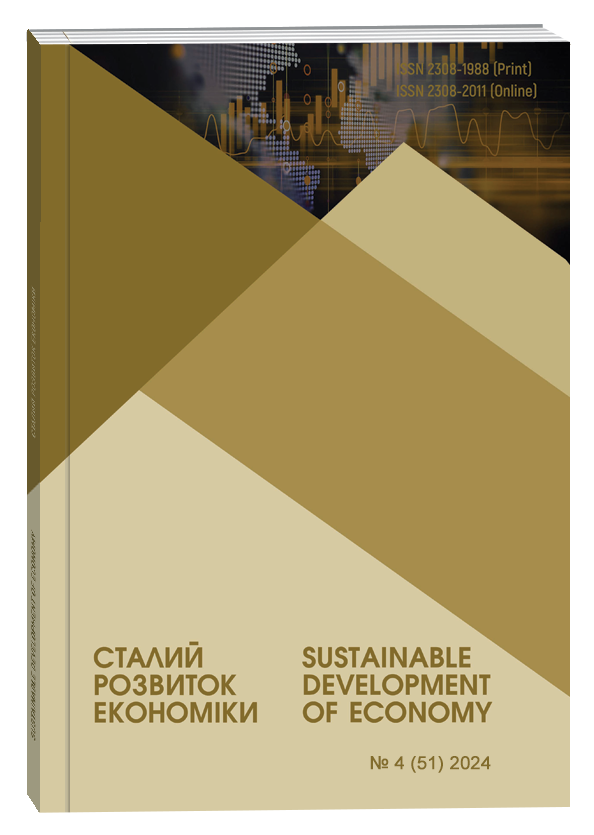TRANSFORMATION OF ECONOMIC, FINANCIAL AND PRODUCTIVE SYSTEMS ACCELERATES THE TRANSITION TOWARDS SUSTAINABLE DEVELOPMENT
Abstract
The article examines the imperative transformation of economic, financial, and productive systems to achieve sustainable development goals (SDGs). It emphasizes the "triple bottom line" of economic prosperity, social inclusion, and environmental sustainability. Key challenges include aligning market incentives with ecological and societal goals through measures such as internalizing environmental costs, fostering a circular economy, and reforming fiscal policies. The paper highlights the necessity of significant investments in renewable energy, sustainable agriculture, and infrastructure to meet SDG targets. It also explores frameworks like the United Nations' System of Environmental-Economic Accounting and inclusive wealth metrics for better policy guidance. Sustainable food systems, enhanced water use efficiency, and climate-resilient production models are presented as critical pathways. Areas requiring further research are identified, including the integration of natural capital into national accounts and the balance between economic growth and resource preservation. The study underscores the importance of public-private partnerships in financing green technologies and infrastructure, which can accelerate progress toward sustainability goals. It advocates for decarbonization strategies in industrial production, emphasizing cleaner technologies and energy efficiency. Furthermore, the authors stress the need for just transitions that support vulnerable communities during shifts toward greener economies. The role of innovative financial instruments, such as green bonds and sustainability-linked loans, is highlighted as crucial in mobilizing capital for sustainable projects. Technological innovation in sectors like transportation and manufacturing is identified as a driver of long-term environmental and economic resilience. Additionally, the article discusses the role of policy coherence in achieving SDGs, ensuring that environmental, economic, and social policies are mutually reinforcing. The authors emphasize education and workforce development to prepare societies for the demands of green economies and new sustainable industries. They also recognize the need for international collaboration to address global challenges such as climate change and resource scarcity. Promoting biodiversity conservation and ecosystem restoration is seen as essential for maintaining the natural systems that underpin economic stability. Finally, the paper highlights the importance of data-driven decision-making and sustainability metrics to track progress and guide policy adjustments effectively.
References
Andersen, S.O., Halberstadt, M.L. and Borgford-Parnell, N. Stratospheric ozone, global warming, and the principle of unintended consequences. An ongoing science and policy success story. Journal of the Air & Waste Management Association. 2013. № 63(6). P. 607–647. DOI: https://doi.org/10.1080/1096224 7.2013.791349
Anthony, S. Johnson, C. K., Greig, J. D., Kramer, S., Che, X., Wells, H.et al. Global patterns of coronavirus diversity. 2017 Vol. 3(1) DOI: https://doi.org/10.1093/ve/vex012
Arrow, K., Dasgupta, P., Goulder, L., Mumford, K. and Oleson, K. Sustainability and the measurement of wealth. Environment and Development Economics. 2012. № 17. P. 317–353. DOI: https://doi.org/10.1017/S1355770X12000137
Balmford, A., Green, R. and Phalan, B. Land for food & land for nature. 2017. № 144. P. 57–75. DOI: https://doi.org/10.1162/ DAED_a_00354
Bar-On, Y.M., Phillips, R. and Milo, R. The biomass distribution on Earth. Proceedings of the National Academy of Sciences. 2018. № 115(25). P. 60–65. URL: http://www.pnas.org/ content/115/25/6506.abstract
Bolam, F.C., Mair, L., Angelico, M., Brooks, T.M., Burgman, M., Hermes, C. et al. How many bird and mammal extinctions has recent conservation action prevented? 2020. DOI: https://doi.org/10.1111/conl.12762
Borrelli, P., Robinson, D.A., Fleischer, L.R., Lugato, E., Ballabio, C., Alewell, C. et al. An assessment of the global impact of 21st century land use change on soil erosion. Nature Communications. 2017. № 8(1). DOI: https://doi.org/10.1038/s41467- 017-02142-7
Brauer, M., Brook, J.R., Christidis, T., Chu, Y., Crouse, D.L., Erickson, A. et al. Mortality–Air Pollution Associations in Low-Exposure Environments (MAPLE): Phase 1. Health Effects Institute. Boston, MA. 2019. URL: https://www.healtheffects.org/system/files/brauer-rr203-phase1-report_2.p
Brooke, W., Venter, O., Allan, J., Scott, A., Rehbein, J., Ward, M. et al. Change in terrestrial human footprint drives continued loss of intact ecosystems. Dryad. 2020. DOI: https:// doi.org/10.5061/dryad.3tx95x6d9
Johnson, C.K., Hitchens, P.L., Pranav, S.P., Rushmore, J., Evans, T.S., Young, C.C.W et al. Global shifts in mammalian population trends reveal key predictors of virus spillover risk. Proceedings of the Royal Society. 2020. № 287(1924). DOI: https://doi.org/10.1098/rspb.2019.2736
Duarte, C.M., Agusti, S., Barbier, E., Britten, G.L., Castilla, J.C., Gattuso, J.-P. et al. Rebuilding marine life. 2020. № 580(7801). P. 39–51. DOI: https://doi.org/10.1038/s41586-020-2146-7
Environmental Effects Assessment Panel. Environmental Effects and Interactions of Stratospheric Ozone Depletion, UV Radiation, and Climate Change. 2018 Assessment Report. United Nations Environment Programme. Nairobi, Kenya. 2019. URL: https://ozone.unep.org/sites/default/files/2019-04/EEAP_assessment-report-2018%20%282%29.pdf
Food and Agriculture Organization of the United Nations and United Nations Environment Programme. The State of the World’s Forests. 2020. Forests, Biodiversity and People. Rome. DOI: https://doi.org/10.4060/ca8642en
Six Transformations to Achieve the Sustainable Development Goals. Jeffrey D. Sachs, Guido Schmidt-Traub, Mariana Mazzucato, Dirk Messner, Nebojsa Nakicenovic, and Johan Rockström. 2020. DOI: https://doi.org/10.1038/s41893-019-0352-9
Green tourism in the context of sustainable development and challenges of the global economic crisis / Zinchuk T.O., Usiuk T.V. 2020. DOI: https://doi.org/10.32983/2222-0712-2020-3-11-17


